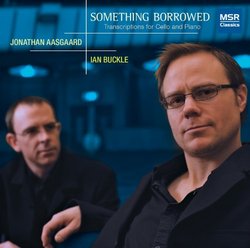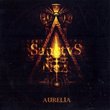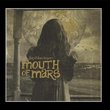| All Artists: Jonathan Aasgaard (cello);Ian Buckle (piano) Title: Something Borrowed: Transcriptions for Cello and Piano Members Wishing: 1 Total Copies: 0 Label: MSR Classics Release Date: 3/29/2010 Genres: New Age, Classical Style: Instrumental Number of Discs: 1 SwapaCD Credits: 1 UPC: 681585137826 |
Search - Jonathan Aasgaard (cello);Ian Buckle (piano) :: Something Borrowed: Transcriptions for Cello and Piano
 | Jonathan Aasgaard (cello);Ian Buckle (piano) Something Borrowed: Transcriptions for Cello and Piano Genres: New Age, Classical
In search of a coherent definition of musical transcription in the sense embodied by the works recorded here, the Oxford Dictionary of Music suggests: Arrangement of musical composition for a performing medium other than o... more » |
Larger Image |
CD Details
Synopsis
Product Description
In search of a coherent definition of musical transcription in the sense embodied by the works recorded here, the Oxford Dictionary of Music suggests: Arrangement of musical composition for a performing medium other than original or for same medium but in more elaborate style. This is somewhat bland and in some way asks more questions than it offers answers. Why does it need to be more elaborate? Understandably, the range of possible purposes of such a transcription is not even explored in such a brief article. We can, however, be rather more explicit, especially when surveying a galaxy of such transcriptions and arrangements between the times of Mozart and today. Some composers are interested enough in their source-material to make it available in a new form e.g. rendering piano pieces into orchestral colouring (as exemplified by Ravel). Other composers may be pupils, friends or admirers think of the way that Rimsky-Korsakov lovingly remodeled the works of his friend Mussorgsky, only to have a succeeding generation of music-lovers be supercritical of how and why he did so! Alternatively, possibly someone from a later era and contrasting aesthetic standpoint may have a legitimate reason for revisiting the music of an earlier age thus contemporary German composer Detlev Glanert in a role somewhere between orchestrator and composer tackles Brahms s Vier ernste Gesange and produces a work with newly-composed postludes/ connections alongside a sympathetically Brahmsian orchestration. Hans Zender produces a notionally co-authored work with Schubert, making a chamber orchestra-sized version of Winterreise but with significant compositional interventions and deviations. In some ways this is merely the continuation of a line which was perhaps at its most explicit in the time of Liszt, a composer who made arrangements and adaptations of his own songs and countless others by Schubert, Schumann, Beethoven and others, at the same time producing new hybrid works with titles like Fantasia which melded operatic excerpts from composers like Mozart, Verdi and Wagner with his own formidable compositional apparatus.
Similar CDs
| Sanctus Nex Aurelia Genre: Metal | |
| Fabio Concato Voila-Live Genres: International Music, Pop Label: Mercury Italy | |

 Track Listings (15) - Disc #1
Track Listings (15) - Disc #1


